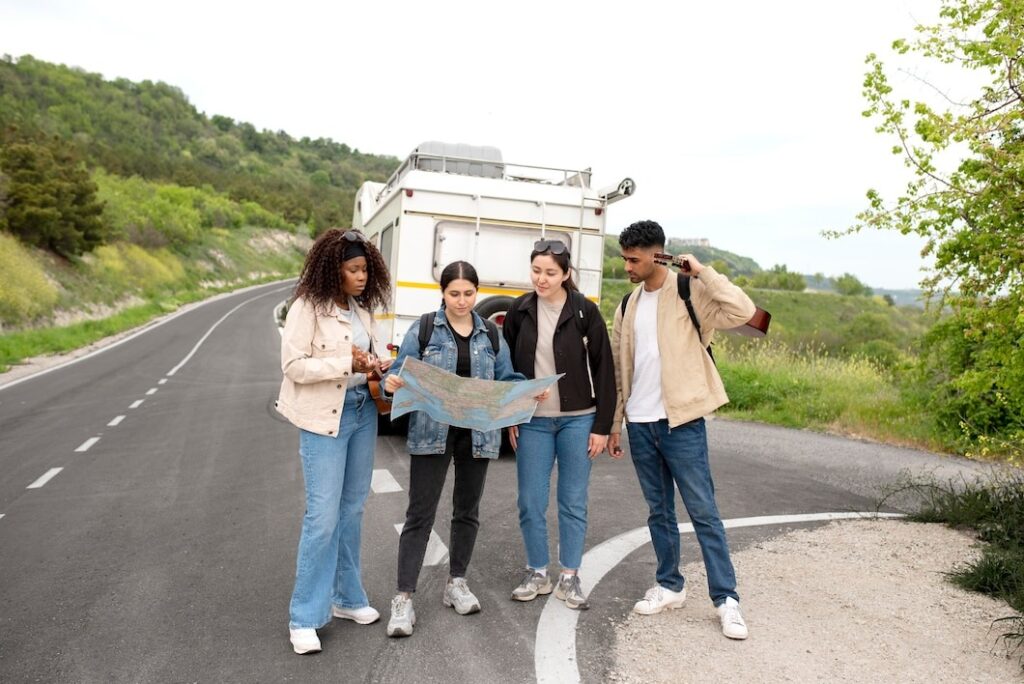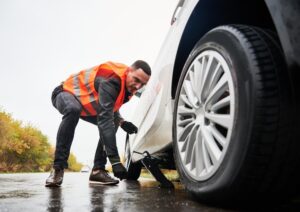Embarking on a road journey can offer a thrilling opportunity to discover destinations, relish picturesque landscapes and strengthen the bond with your fellow travelers. However it can also present difficulties, stress and unforeseen circumstances if you fail to plan and steer clear of pitfalls. To ensure a seamless and unforgettable road trip experience here are nine factors you should be aware of prior to hitting the road.
1. Clean your car before and during your trip
Starting your road trip with a cluttered car is something you definitely want to avoid. It not only makes you feel uncomfortable and distracted but it also creates difficulty in finding things you need or packing new items along the way. Before hitting the road take some time to clean and sanitize your car by vacuuming and wiping it down. Get rid of any trash, empty bottles or old receipts. Keep your documents, maps, gadgets and chargers organized in a glove box or dashboard holder. Ensure that there’s space for your luggage, snacks, drinks and emergency kit.
During your trip make an effort to keep your car as clean as possible. Don’t leave food wrappers, napkins or cups lying around. Use a trash bag or bin to collect garbage and dispose of it at rest stops or gas stations. Every day quickly sweep your car to eliminate any dirt, dust or crumbs that may have accumulated. You’ll be amazed at how better you’ll feel in a tidy and fresh smelling car.
2. Check your vehicle before you hit the road
Before setting off on your road trip it’s crucial to prevent any car breakdowns or malfunctions along the way. To ensure a journey it’s recommended to have your vehicle inspected by a mechanic or conduct the inspection yourself. Here are some key areas to check before hitting the road;
- Fluid levels: Ensure that the levels of your oil, coolant, brake fluid, transmission fluid, power steering fluid and windshield washer fluid are all properly maintained. If necessary add fluid to bring them to the optimal levels or replace them if they appear dirty or have been in use for a long time.
- Tires: Check the tire pressure and tread depth of all your tires, including the spare one. Inflate them if they are low or replace them if they are worn out. Also check for any cracks, bulges, or nails in your tires.
- Brakes: Test your brakes for any squeaking, grinding, or pulsing sounds. If you notice any of these signs, have your brakes inspected and repaired by a professional.
- Lights: Check all your lights, including headlights, taillights, brake lights, turn signals, and hazard lights. Replace any burnt-out bulbs or fuses.
- Battery: Be sure to examine your battery for any indications of corrosion or leaks. If your battery is, than three years old or if you’re encountering challenges when starting your car it might be an idea to consider replacing it with a new one.
- Belts and hoses: Check your belts and hoses for any cracks, frays, or leaks. Replace them if they are damaged or worn out.
3. Have a loose plan but be flexible
One of the pleasures of going on a road trip is the freedom to explore wherever and whenever you desire. However it doesn’t necessarily imply that you should embark without any plan. Having a plan in place can assist in saving time, money and reducing stress during your journey. Here are some aspects you should consider planning for;
- Your route: First determine your desired starting and destination points for your road trip. Then consider the amount of time you want to allocate for the journey. Next conduct some research to find the routes based on factors such as distance, traffic conditions, picturesque landscapes and interesting points of interest along the way. Utilize resources, like Google Maps or Roadtrippers to help you plan your route and provide detailed directions.
- Your stops: Make sure to plan for your journey by deciding where you’d like to take breaks for fuel, meals, relaxation or exploring interesting sights. There are helpful apps like GasBuddy or Yelp that can assist you in locating the most affordable gas stations and restaurants in your vicinity. Additionally websites such as Roadside America or Atlas Obscura offer recommendations for one of a kind and peculiar attractions that you can discover along your chosen route.
- Your accommodation: Plan where you want to stay each night of your trip based on your budget, preferences, and availability. You can book hotels, motels, campgrounds, or vacation rentals online using websites like Booking.com or Airbnb . You can also use apps like HotelTonight or iOverlander to find last-minute deals or free camping spots.
However, having a plan doesn’t mean you have to stick to it rigidly. Be flexible and open to changes along the way based on the weather, traffic, road conditions, or your mood. You might discover new places or meet new people that you didn’t expect. You might also encounter delays or detours that you can’t avoid. Don’t let these things ruin your trip. Instead, embrace them as part of the adventure and enjoy the journey.
4. Check COVID-19 travel restrictions along the way
The COVID-19 pandemic has changed the way we travel and the rules we have to follow. Before you go on a road trip, you should check the COVID-19 travel restrictions and guidelines of the places you plan to visit. Depending on the location, you might have to:
- Show proof of vaccination or a negative test result
- Wear a mask or face covering in public places
- Practice social distancing and avoid large gatherings
- Follow curfews or lockdowns
- Quarantine for a certain period of time
You can use websites like CDC or Reopen EU to find the latest information on COVID-19 travel restrictions and recommendations by country or state. You can also check the official websites of the local authorities or tourism boards of the places you plan to visit for more specific and updated information.
5. Pack smart and light
Going on a road trip requires packing. It’s essential to bring all the items without overcrowding your car. Here are some helpful suggestions, on how to pack and travel light for a road trip;
- Make a packing list: Make a list of everything you’ll require for your journey, including clothing, personal care items, electronics, important papers, snacks, beverages and so on. Then eliminate anything that’snot necessary or can be purchased during your travels.
- Choose versatile and comfortable clothes: When packing for your trip make sure to bring clothes that are appropriate, for the weather, activities and places you’ll be visiting. Select garments that can be easily mixed and matched layered and cleaned. Opt for fabrics that allow your skin to breathe, resist wrinkles and dry quickly. It’s best to avoid packing fragile items that need special attention.
- Use packing cubes and organizers: You can maximize space. Maintain an organized car by utilizing packing cubes and organizers to categorize your belongings, including clothes, shoes, toiletries and more. This practical approach will not make it easier to locate items but also ensure a tidy travel experience.
- Pack an emergency kit: Prepare an emergency kit with supplies that can assist you in situations such as vehicle breakdowns, accidents, injuries or illnesses. Some suggested items to include are jumper cables, a tire inflator, a flashlight, a first aid kit, water, non perishable food items and blankets.
6. Bring entertainment and fun
Road trips can be fun and exciting, but they can also be boring and tedious at times. Especially if you have to drive for long hours or through dull landscapes. To keep yourself and your travel companions entertained and happy on the road, you should bring some entertainment and fun options. Here are some ideas:
- Music: Music is a companion for every road trip. It has the ability to establish the right atmosphere, uplift your spirits and make the hours pass swiftly. Whether you prefer crafting your playlists indulging in expertly curated collections that align with your preferred genre or mood or exploring a vast library of millions of songs for fresh discoveries there are various music streaming applications available. Services like Spotify, Apple Music or Pandora offer access to music both online and offline.
- Podcasts: Podcasts offer a way to make the most of your time while traveling and gain knowledge along the way. There is a range of podcasts available covering various subjects such as comedy, history and true crime. To enjoy them during your journey you can. Download podcasts in advance using apps, like Stitcher, Pocket Casts or Google Podcasts or stream them directly on the go.
- Audiobooks: Audiobooks are perfect for drives because they allow you to immerse yourself in a captivating book while still maintaining your attention on the road and keeping your hands on the steering wheel. You have a variety of choices including timeless classics, popular bestsellers and published titles. You can easily access audiobooks online or offline using applications such as Audible, Libby or Scribd.
- Games: Games are a fun way to interact with your travel companions and have some laughs on the road. You can play classic car games like I Spy, 20 Questions, or License Plate Bingo. You can also play trivia games, word games, or card games using apps like Heads Up!, Trivia Crack, or UNO.
7. Stay safe and healthy on the road
Road trips can offer thrilling experiences but they can also present potential dangers and fatigue if proper precautions are not taken to ensure personal well being and vehicle maintenance. To guarantee an enjoyable journey it is important to adhere to the following suggestions;
- Drive safely: Follow the speed limit, traffic rules, and road signs. Avoid distractions like texting, eating, or fiddling with the radio while driving. Use seat belts, airbags, and child safety seats correctly. Don’t drink and drive or drive under the influence of drugs or medications.
- Take breaks: Don’t drive for too long without taking breaks. Stop every two hours or 100 miles to stretch your legs, use the bathroom, or grab a snack or a drink. This will help you prevent fatigue, stiffness, and boredom. You can also switch drivers if you have someone else who can drive.
- Stay hydrated and nourished:Make sure to stay hydrated and opt for snacks and meals while traveling. It’s best to steer clear of alcohol, caffeine, sugar and unhealthy food choices as they can lead to dehydration, blood sugar spikes and a general feeling of sluggishness. Instead go for water, juice, fruits, nuts, granola bars or sandwiches. If you want to keep your beverages chilled and refreshing throughout the journey consider packing a cooler, with ice.
- Get enough sleep: Getting sleep is essential for your well being and safety while driving. Insufficient sleep can have impacts on your ability to make decisions, react quickly and stay focused. It can also increase the chances of accidents, errors and road rage incidents. It’s important to aim for seven hours of sleep every night before getting behind the wheel. If you start feeling tired or drowsy during your drive it’s best to find a place to pull over and take a nap or look for a nearby place to stay for the night.
8. Document your trip and memories
Road trips are full of memorable moments and experiences that you don’t want to forget. That’s why you should document your trip and memories in different ways. Here are some ideas:
- Take photos and videos: Immerse yourself in the wonder, the joy and the heartfelt moments of your road trip by capturing them through photographs and videos. Whether you rely on your smartphone, camera or GoPro you have options to snap pictures and shoot videos of the breathtaking landscapes captivating attractions, fascinating people and memorable events that unfold during your journey. Additionally you can utilize apps such as Instagram, Snapchat or TikTok to enhance your visuals with filters and edits before sharing these cherished memories with your loved ones.
- Write a journal or a blog: Consider documenting your thoughts, emotions and experiences from your road trip in a journal or blog. You have options for writing such as using a physical notebook, a laptop or a tablet to write by hand or type. Additionally you can utilize applications, like Evernote, Day One or WordPress to create journals or blogs that can be synchronized across devices and accessed online.
- Collect souvenirs and mementos: Make sure to gather souvenirs and keepsakes during your road trip to commemorate the places you visit. You can purchase postcards, magnets, stickers, keychains or even t-shirts from shops or popular attractions. Additionally consider collecting items, like rocks, shells, leaves or flowers that you come across for free. These souvenirs and mementos can be used to adorn your car, home or scrapbook as a way to remember your journey.
9. Have fun and enjoy the ride
The key aspect to remember prior to embarking on a road trip is to savor the experience and relish the adventure. Road trips are not about reaching a destination but about appreciating the journey itself. Refrain from allowing stress, expectations or challenges to dampen your excursion. Instead embrace surprises, overcome obstacles with determination and seize opportunities that come your way. Maintain a minded and inquisitive attitude as you embark on new experiences, encounter unfamiliar faces and acquire knowledge along the way. Allow yourself to laugh freely, sing joyfully and dance spontaneously. Create memories, establish new connections with fellow travelers and cultivate stories worth sharing. Above all else, prioritize enjoyment and fully immerse yourself in the ride.
Conclusion

Embarking on road trips is a way to discover new destinations and indulge in travel adventures. However it’s important to remember that successful road trips require planning, preparation and safety measures. By familiarizing yourself with these nine tips before hitting the road you can ensure an unforgettable and enjoyable journey.




